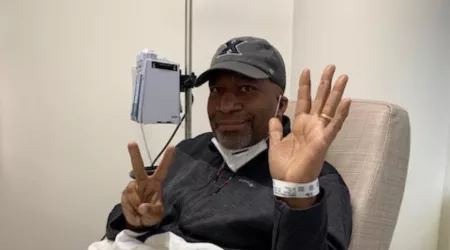How to live well with colorectal cancer
As a patient, caring for yourself beyond treatment is important. We recommend an integrative, holistic approach to self-care.

Try an integrative health approach
Integrative health is an important model in cancer care, bringing conventional and complementary approaches together. It emphasizes a holistic, patient-focused approach to balance the body, mind, and spirit.
Find your balance
Balance is key to your living well with Colorectal cancer

Nutrition
Making healthy food choices that fit overall lifestyle choices can make a meaningful difference throughout your path with colorectal cancer.

Fertility
Surgery, chemotherapy, and radiation can significantly affect fertility. Having conversations about fertility preservation before treatment begins is important for patients who wish to have biological children later.

Intimacy and sexual health
Sexual dysfunction is one of the most common long-term side effects of colorectal cancer treatment, and it’s an issue that is rarely discussed among patients and their providers.

Ostomy
If you're faced with a surgery that may require an ostomy or temporary ileostomy, we've curated information about nutrition, sexual health, pain management, hydration, and more.

Physical activity
It’s good to be physically active during colorectal cancer treatment, but each person’s exercise program should be based on what’s safe and works best for them.

Pain management and stress reduction
Learn new ways to help manage chronic pain during treatment and survivorship. Explore natural treatments such as acupuncture, massage, and yoga for your overall care plan.

Emotional health
Just as cancer affects your physical health, it can bring up a wide range of unexpected feelings. These feelings are all normal.

Palliative care
Palliative care is specialized medical care for people with a serious illness. It is appropriate at any age and any stage, and can be combined with curative treatment.
Call the Helpline
Our Helpline is free. Connect with certified patient and family support navigators who are ready to listen and support you.
Top resources

Chris Amos: a patient in a family of survivors
Though facing a colorectal cancer (CRC) diagnosis isn’t easy, Chris continues to show up with grace and courage as he moves through his journey to wellness.

Pet therapy for cancer patients
Pets can be an incredible source of comfort and joy for anybody but, for cancer patients, pet therapy can provide emotional and psychological support to enhance a person’s overall well-being.

Integrative wellness: Supplemental supports for managing a colorectal cancer diagnosis
Finding out you or a loved one has colorectal cancer can be overwhelming. While standard treatments like surgery, chemotherapy, and radiation remain the cornerstone of cancer care, many patients are exploring supportive therapies to enhance their overall quality of life.





